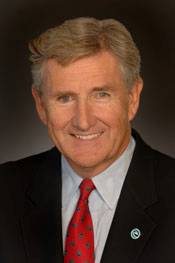More than 43 percent of the nation’s imports enter the Ports of Long Beach, Los Angeles, Hueneme and San Diego — creating jobs, income and tax revenue in all 50 states.
BREAKING:
Mobility 21’s Kristin Decas and Fran Inman
to Serve on National Freight Advisory Committee
Today U.S. Transportation Secretary Ray LaHood announced the members of the National Freight Advisory Committee, including Mobility 21 Advisory Board Members Kristin Decas and Fran Inman. This important 47-member committee will provide recommendations to the Secretary to improve the national freight transportation system.
“The strength of our economy and the strength of our national freight system go hand in hand,” said Secretary LaHood in a statement. “The members of this committee understand firsthand the critical importance of freight movement, and their valuable insight will help ensure that our system is more secure and better connected.”
Decas and Inman’s fluency in the needs of our goods movement system will be extremely valuable to the committee. As Executive Director of the Port of Hueneme in Ventura County, Decas leads the port’s operations in transporting over $7 billion in cargo and supporting an economic impact of $1 billion. Inman, Senior Vice President of Majestic Realty and California Transportation Commissioner, has demonstrated regional leadership and a commitment to improving our nation’s trade gateways throughout her career by serving on numerous statewide and regional goods movement committees. Given Southern California’s critical role in the nation’s freight network, Decas and Inman will be important voices for our region as members of the committee.
Please join us in congratulating Kristin Decas and Fran Inman on this important announcement! Click here to view the list of committee members.
Metrolink Expansion in the Inland Empire
Dealt Setback by CEQA Lawsuit

Train riders and transit advocates received a jolt of bad news on May 16 when a judge decertified the Environmental Impact Report for the Perris Valley Line Metrolink project in Riverside County.
The Perris Valley Line project extends the existing Metrolink 91 Line for an additional 22 miles from Downtown Riverside to South Perris in Rverside County along a rail right-of-way that has been in place for more than a century. The proposed project, which would be funded through a combination of Riverside County’s voter-approved Measure A sales tax program, the State Transportation Improvement Program and federal grant funds.
“Freight trains have run along these tracks since the 1800s,” said Riverside County Transportation Commission (RCTC) Chairwoman Karen Spiegel. “Our intent is to serve more people and attract new employers by offering attractive and reliable passenger rail service on the existing right-of-way.”
In addition to traffic and congestion impacts, RCTC officials are also concerned about economic impacts if the project remains stalled. By placing its contractor on hold, more than $35 million in wages to construction workers are sitting idle and staying out of the Southern California economy.
New stations are slated for high employment areas such as the Hunter Park Business Complex in Riverside and the March Air Reserve Base. Yet another station would complement the new multi-modal transit center Downtown Perris. The project had also received approval for $75 million in federal funding.
The judge’s ruling can be appealed and RCTC is required to respond within 90 days on compliance with the Court’s mandate.
“We know how important this project is for Southern California,” said RCTC Executive Director Anne Mayer. “It’s been approved by Riverside County voters; it’s in the RTP and it makes the 91 Metrolink Line more accessible to thousands of additional people.
“We’re going to keep working as hard as we can to build this project as soon as possible and appreciate Mobility 21’s support.”
For more information on the Perris Valley Line project, please see http://perrisvalleyline.info.
Hurry! Registration for Inaugural
Legislative Dinner Closes Monday
Join the Mobility 21 Board of Directors and Advisory Board Members in honoring Southern California’s champions of transportation at our first-ever legislative dinner. We will roll out the red carpet to thank several of our region’s legislators for their tireless work and leadership in transportation.
Tuesday, June 11
5-6 p.m. Networking and Registration
6-8 p.m. Dinner
Esquire Grill
1213 K Street, Sacramento
Emcee just confirmed!
Malcolm Dougherty, Director of Caltrans
Confirmed Award Recipients
Senator Mark DeSaulnier
Senator Bill Emmerson
Assemblymember Bonnie Lowenthal
Senate President pro Tem Darrell Steinberg
Sponsor the event!
$1,000: Best in Show Includes complimentary attendance for three and logo on promotional materials and signage at the event
$500: Supporting Role Includes complimentary attendance for one and company name on promotional materials and signage at the event
Contact Mobility 21 Executive Director Marnie O’Brien Primmer atmprimmer@mobility21.com or 949.288.6884 to sponsor the event.
Registration closes June 3
$75 Private Sector
$50 Public Sector/Nonprofit
$20 Students
Elected officials complimentary
If space permits, a limited number of walk-in registrations may be available at the event for an additional $10 fee.
Optional Donation to Bimla Rhinehart Scholarship
Consider making a donation of $10, $25 or $50 to the California Transportation Foundation’s scholarship in Bimla Rhinehart’s name.

Federal Buy America Requirements
Threaten to Stall Transportation Projects and Jobs
A provision in the federal surface transportation bill, Moving Ahead for Progress in the 21st Century (MAP-21), which changed Buy America requirements, is threatening to hold up dozens of Southern California transportation projects and thousands of good-paying jobs. Buy America requires federally-funded projects to use only iron, steel and manufactured products produced in the U.S.
Transportation projects that undergo the federal environmental review process are now required to comply with Buy America requirements for all utility relocations, whereas utilities were not previously subject to the rules. And since most large-scale transportation projects require the relocation of utilities, that’s where the problem lies. Many utility companies already own surplus materials which do not comply with the new Buy America provisions and are limited in their ability to certify products that comply with the new requirements, thus threatening to stall transportation projects.
Stay tuned for an e-mail from Mobility 21 in the coming weeks if your help is needed to communicate to Congress about the devastating impacts of these requirements — stalling the completion of much-needed transportation projects and the creation of thousands of jobs.
Port of Long Beach Executive Director
to Take the Helm in Oakland
 J. Christopher Lytle, Port of Long Beach Executive Director and Mobility 21 Advisory Board Member since November 2011, recently announced that he will resign to take the top post at the Port of Oakland. Lytle will remain at Long Beach until mid-July, and is expected to begin his new job in Oakland shortly thereafter.
J. Christopher Lytle, Port of Long Beach Executive Director and Mobility 21 Advisory Board Member since November 2011, recently announced that he will resign to take the top post at the Port of Oakland. Lytle will remain at Long Beach until mid-July, and is expected to begin his new job in Oakland shortly thereafter.
“Mobility 21 and all of Southern California will greatly miss Chris Lytle’s tremendous leadership of the nation’s second busiest container seaport,” said Marnie O’Brien Primmer, Executive Director of Mobility 21. “We are grateful for his accomplishments and commitment to improving the heart of our nation’s goods movement system and wish him the best of luck in his next endeavor.”
Lytle has served at the top echelons of the Port throughout its transformation into “The Green Port,” as it carried out its commitment to reduce environmental impacts of its operations.
“My time here in Long Beach has been wonderful and I have been very privileged to work with a talented, dedicated staff and the best customers of any seaport in the world,” Lytle said in a statement. “I’m happy to have played a role in implementing groundbreaking environmental initiatives, attracting new business to the Port and kicking off $4 billion in development projects that will prepare the Port of Long Beach to compete in the future. I will miss the Port of Long Beach, but look forward to exciting new career challenges in Oakland.”
California Transportation Commission
Chair Addresses Fiscal Challenges
 This month we turn our attention to California Transportation Commission (CTC) Chair James C. Ghielmetti to discuss the future of transportation funding, sustainable communities and the role of the business community in advancing transportation.
This month we turn our attention to California Transportation Commission (CTC) Chair James C. Ghielmetti to discuss the future of transportation funding, sustainable communities and the role of the business community in advancing transportation.
M21: What do you see as the role of the CTC going forward as funding for transportation projects increasingly comes from local sources?
JG: Local transportation funding has proven effective in addressing priorities at the local levels, and when combined with available state and federal funding we have been able to accomplish mobility solutions of regional, state and national significance. However, California’s transportation system remains severely underfunded while user demand continues to grow. Aside from expansion needs, much of the system is reaching its service life, and the need to rehabilitate and upgrade it is ever more critical. The current transportation funding system is based primarily on user fees such as the fuel excise tax. However, increased automobile efficiency, the emergence of alternate technologies and fixed taxation rates, have eroded the fuel excise tax’s ability to approximate road usage and fund critical improvements and rehabilitation.
The Legislative Analyst’s Office recently reported that local governments provide almost half of all transportation funding in California. The remaining 50 percent is derived from a combination of state and federal funding and remains a significant resource for leveraging local and private resources to address the system’s most critical needs. Even with available local, state and federal funding, California’s policy makers must recognize that we can no longer afford to operate as we have been. We must work together to pass legislation that provides for new, stable and innovative ways of generating transportation revenues while continuing to provide enhanced mobility, and ensuring that funding decisions contribute to the most efficient and effective transportation system. The CTC has recommended in its annual reports to the Legislature that a variety of options should be considered such as raising the gasoline excise tax and indexing the tax to inflation, establishing a vehicle miles traveled fee and pricing strategies, to name a few.
M21: What is your view of the role of the CTC in the Sustainable Communities Strategy process?
JG: The CTC plays a key role in providing guidance for the development of Sustainable Communities Strategies (SCS) and in funding projects consistent with the SCS. In response to the passage of SB 375, we acted quickly to provide guidance to the Metropolitan Planning Organizations (MPOs) by adopting updated Regional Transportation Plan Guidelines during the spring of 2010. Since that time, we have collaborated with stakeholders to identify and support initiatives that, if implemented, would streamline business practices, reduce regulatory barriers, eliminate threats of unnecessary litigation and incentivize wise land use and transportation decisions to forward the objectives of SB 375. Over the next few months, the CTC will be updating its guidelines for the State Transportation Improvement Program to incorporate processes and metrics that would align investment decisions with state sustainability goals, life cycle requirements and performance objectives.
M21: The CTC’s annual report details a fairly significant gap between available resources and need, what do you see happening to fill this gap?
JG: For over a decade, the CTC has voiced its concerns in its annual reports to the Legislature that the predictability of funding and the level of investment in the state’s transportation system have not kept pace with the increasing demands for the movement of both people and goods. The 2011 Statewide Transportation System Needs Assessment performed at the request of the CTC identified a projected funding shortfall of $296 billion over the next decade across all modes of transportation. Failing to adequately invest in the restoration of California’s roads, highways, bridges, airports, seaports, railways, border crossings and public transit infrastructure will lead to further decay and deterioration of service from which it will take many years and an even greater investment to recover.
Acknowledging the 2011 Statewide Transportation System Needs Assessment, the Governor’s 2013/14 Budget Proposal charged the Transportation Agency (Agency) with convening a workgroup consisting of state and local transportation stakeholders to refine the needs assessment, explore long-term, pay-as-you-go funding options and evaluate the most appropriate level of government to deliver high-priority investments to meet the state’s infrastructure needs. The CTC commends the Governor’s foresight and the focused attention this action will bring to address our state’s growing transportation needs. The CTC is working closely with the Agency and looks forward to regular updates at its scheduled Commission meetings.
M21: What additional things can the business community do to support investments in transportation?
JG: Over the years, I have been encouraged by the close working relationship the CTC has had with business community leaders in the development of guidance for public-private-partnerships, design-build, Proposition 1B and other programs. The business community is needed now more than ever to educate the public and the state’s policy makers on the need for stable and reliable revenue source(s) for transportation to achieve the state’s mobility, safety and sustainability goals. The business community is a critical stakeholder that should be more than ever intimately involved in the development of regional transportation plans and associated sustainable communities strategies. How these plans are developed and how investments are identified and prioritized will have a significant impact on a region’s economic development, and the economic productivity of the business community. True partnerships are urgently needed to plan, fund and build the infrastructure that promotes all aspects of a community’s success.
VCTC Jumps into Action to
Assist with Fire Evacuations
With fires moving across Ventura County earlier this month, the Ventura County Transportation Commission (VCTC) assisted those in need – helping to evacuate approximately 165 fifth graders and chaperones at Camp Hess Kramer near Yerba Buena Road off the Pacific Coast Highway.
The night of the evacuation, VCTC received the call from the Ventura County Sheriff’s Office at approximately 9 p.m. requesting aide. Within 30 minutes, VCTC and Roadrunner Management Services were able to dispatch seven VISTA buses from Camarillo to the camp with Sheriff escort. Upon arrival, officials swooped into action and promptly drove the campers to safety.
Transportation Corridor Agencies
Names Neil Peterson New CEO
 The Transportation Corridor Agencies announced that Neil Peterson will take the helm as chief executive officer of the organization beginning June 3.
The Transportation Corridor Agencies announced that Neil Peterson will take the helm as chief executive officer of the organization beginning June 3.
“Peterson is an executive and entrepreneur with extensive expertise in the transportation industry, with more than four decades of leadership experience in the public, private and non-profit sectors,” said Lisa Bartlett, Chairwoman of the Foothill/Eastern Transportation Corridor Agency. “He was chosen from a nationwide search that began in Nov. 2012. More than 50 candidates applied for the position and Neil’s background and experience clearly made him the frontrunner to lead TCA through our major initiatives including converting to all electronic tolling and construction of the State Route 241 Tesoro Extension.”
Peterson joins TCA having served as a senior transportation strategy consultant with CH2M Hill and, prior to that, Booz, Allen & Hamilton. He is the founder of the non-profit Edge Foundation, which provides coaches for adolescent students with executive functioning challenges, ADHD being the most severe. Peterson was the founding CEO of the car-sharing company Flexcar, now named Zipcar and a subsidiary of Avis Budget Group Inc.
As CEO of TCA, one of Mobility 21’s partners, he will join our Advisory Board. We look forward to working with him!
SANBAG’s Local Stimulus Program Concludes
In 2009, the San Bernardino Associated Governments (SANBAG) was awarded $128 million in Federal American Recovery and Reinvestment Act (ARRA) funds for the I-215 Widening Project through San Bernardino. Subsequently, the SANBAG Board of Directors created a Local Stimulus Program in the amount of $31.4 million to be distributed to the city and county jurisdictions, based on a per capita basis, with no agency to receive less than $300,000. Cities and county areas determined the best projects to fund.
Local Stimulus Program Accomplishments
• Total Number of Projects: 101
• Total Actual Jobs Created 1,197
• Approximate Lane Miles Added: 11
• Approximate Lane Miles Rehabilitated: 221
• Approximate Linear Feet of Sidewalks Added: 2,957
• Approximate Linear Feet of Sidewalks Repaired: 19,407
• Number of Signals Added: 6
• Roadway Safety Projects: 5
• Number of Bus Shelters Added: 6
“We are pleased that these funds could be distributed among the 24 cities and county areas in San Bernardino County,” stated SANBAG Executive Director Ray Wolfe and Mobility 21 Board Member. “Since we received federal stimulus funds for the major I-215 Widening Project, this was our way to give every city the opportunity to benefit from the stimulus program.”
With the cooperation of the staff of the member jurisdictions, the program has successfully achieved its goals to provide additional funds for local roadway rehabilitation and reconstruction; to stimulate the economy through job creation; to increase capacity, mobility, and safety; and to match other available funding sources.
RCTC Awards Contract for
SR-91 Corridor Improvement Project
 Within only a few short months, construction will begin on a $1.3 billion project to widen State Route 91 (SR-91) through Corona. With project financing in place, the the Riverside County Transportation Commission (RCTC) approved entering into an agreement with Atkinson/Walsh, a Joint Venture, for a little over $632.6 million to design-build the express lane project. In addition, an $81.4 million construction management contract was awarded to Parsons Transportation Group to oversee the project and a $30.9 million agreement was awarded for operations and maintenance services.
Within only a few short months, construction will begin on a $1.3 billion project to widen State Route 91 (SR-91) through Corona. With project financing in place, the the Riverside County Transportation Commission (RCTC) approved entering into an agreement with Atkinson/Walsh, a Joint Venture, for a little over $632.6 million to design-build the express lane project. In addition, an $81.4 million construction management contract was awarded to Parsons Transportation Group to oversee the project and a $30.9 million agreement was awarded for operations and maintenance services.
The SR-91 Corridor Improvement Project, also known as “The 91 Project,” is generally described as extending the existing 91 Express Lanes into Riverside County and the addition of a general purpose lane in each direction. The project will also improve seven interchanges, make local street and access improvements, add more express bus service and construct a number of auxiliary lanes at key locations to ease access on and off the freeway, especially between the 91 and Interstate 15. The SR-91 Corridor Improvement Project is scheduled to open to traffic in 2017.
“Improving the 91 with this project ensures that Corona and the rest of Riverside County are easier to access for residents, employers, businesses, public transit users and tourists,” said Corona City Councilmember Karen Spiegel who also serves as RCTC Chair. “During peak hours some drivers will be able to save as much as 90 minutes per day on their round-trip commute.”
The project will be paid for through a combination of voter-approved Measure A sales tax funds and toll revenue bonds which finance the toll component of the project. RCTC was one of only a handful of agencies to receive an award from TIFIA – which stands for Transportation Infrastructure Financing Innovation Act – and provides credit assistance for large-scale transportation projects. The TIFIA award enables RCTC to obtain a subsidized loan for a third of the project cost.
Full project details are available at http://sr91project.info
Speakers at the Southern California Association of Governments (SCAG) Regional Conference included: Rep. Raul Ruiz, Lt. Gov. Gavin Newsom, State Controller John Chiang, SCAG Immediate Past President Glen Becerra and SCAG President Greg Pettis.
SCAG Hosts Successful Regional
Conference and General Assembly
Nearly 1,000 thought leaders and policy makers from across the region gathered for Southern California Association of Governments’ (SCAG) highly successful Regional Conference & General Assembly, May 2–3, at the JW Marriott Resort & Spa in Palm Desert. Check out highlights from the conference, including photos, videos and presentations online atwww.scag.ca.gov/ga2013.
“I am very thankful to the Regional Council for their enthusiastic support of this event. This has been, by far, the most well-attended, information packed and best-executed conference this agency has hosted,” said SCAG Executive Director Hasan Ikhrata and Mobility 21 Board Member. “I am very thankful to all of our speakers, breakout session panelists, sponsors and staff for their contributions to this event. I am very proud to be associated with this organization and offer my sincere congratulations to everyone who had a hand in planning and implementing this conference. They did an outstanding job.”
Highlights of the event included keynote addresses from U.S. Representative Raul Ruiz from California’s 36th Congressional District and Lt. Governor Gavin Newsom; participation of a number of economic experts, including State Controller John Chiang, on the Economic Recovery & Innovation panel; recognition of Simi Valley City Council Member Glen Becerra’s service as SCAG President in 2012-2013 and the election of SCAG’s 2013-2014 Officers: President, Hon. Greg Pettis; First Vice-President, Hon. Carl Morehouse; and Second Vice-President, Hon. Cheryl Viegas-Walker.
During SCAG’s awards sinner, four individuals received SCAG’s President’s Award for their material and significant contributions in helping SCAG achieve major goals and objectives this year:
Regional Partnership Leader of the Year: Jessie Knight
Chief Executive Officer of San Diego Gas & Electric and co-chair of the Southern California Leadership Council
Public Sector Leader of the Year: Art Leahy
Chief Executive Officer of the Los Angeles County Metropolitan Transportation Authority and Mobility 21 Board Member
Private Sector Leader of the Year: Fran Inman
Senior Vice President of Industry-based Majestic Realty and Mobility 21 Advisory Board Member
Southern California Sustainability Leader of the Year: Amanda Eaken
Deputy Director of Sustainable Communities for the Natural Resources Defense Council’s Energy & Transportation Program
Move LA: LA’s Got New Mojo 2
5 p.m. | Wednesday, June 12
LA Union Station
More info | Register
Join Move LA’s business-labor-environmental coalition June 12 at LA Union Station to honor Los Angeles Mayor Antonio Villaraigosa’s remarkable transportation accomplishments. Click here to download the flyer.
FuturePorts’ Annual Conference 2013
STRONG PORTS = STRONG CALIFORNIA
Collaborating for Success
Wednesday, June 19
Renaissance Long Beach Hotel
More info | Register
This year’s FuturePorts summit will address critical topics facing the Southern California goods movement industry and focus on bringing all stakeholders together to collaborate on solutions that ensure a healthy California economy and environment. Click here to download the flyer.
Check out these fuel savings tips from AAA!
Transportation Events in the Community
Wednesday, June 12
Move LA: LA’s Got Mojo
More info | Register
Wednesday, June 12
Southern California Gas Company and Cummins Westport: New Engine Technology for Natural Gas Trucks Webinar
More info | Register
Thursday, June 13
WTS-LA: LA Streetcar Program Update
More info | Register
Wednesday, June 19
FuturePorts: Annual Conference
More info | Register
Thursday, June 20
SANBAG: General Assembly
More info
Thursday, June 20
WTS-SD: San Diego Airport – Mastering the Art of Airports
More info | Register for program | Register for bus tour
June 23-26
Center for Transportation Excellence: Transit Initiatives & Communities Conference
Atlanta, GA
More info | Register
June 24-27
Alternative Clean Technology Expo: Washington, D.C.
More info | Register
Thursday, June 27
Riverside County: Small Business Expo
More info | Register
Wednesday, July 17
WTS-IE: Resistance to Change – Leadership Applications for Management, Consulting Work and Family Life
More info | Register
Wednesday, July 17
ACEC-LA: Los Angeles World Airports
More info | Register
Wednesday, July 24
WTS-IE: Corporate Partners and WTS-IE Members Only Event
More info | Register
Thursday, July 25
CMAA: Social Media – Construction Management & Owner Benefits
More info | Register
Thursday, July 25
WTS-SD: Scholarship Bowling Fundraiser
More info
Thursday, Aug. 15
WTS-IE: Softball Game
More info
Tuesday, Oct. 29
Mobility 21: 2013 Summit at the JW Marriott at L.A. Live
More info | Sponsor
Nov. 17-19
Self-Help Counties Coalition: Focus on the Future Conference
More info | Sponsor






